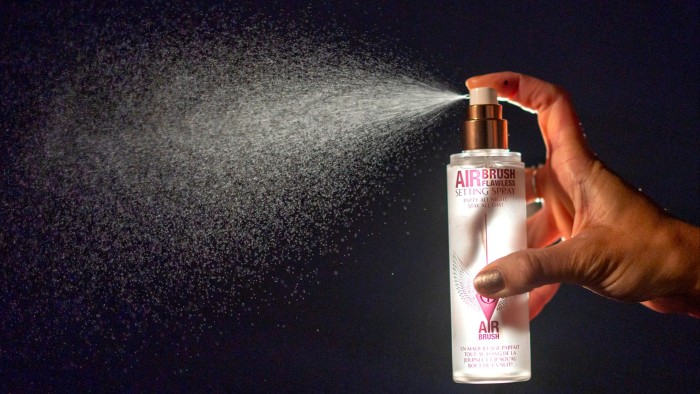Unlock the Editor’s Digest for free
Roula Khalaf, Editor of the FT, selects her favourite stories in this weekly newsletter.
Spanish beauty group Puig announced the withdrawal of a batch of Charlotte Tilbury make-up spray due to a quality problem in a move that sent its share price plunging to the lowest level in its short history as a listed company.
The episode was another setback for the 110-year-old Barcelona-based company which floated on the stock market in May. Its shares fell by as much as 9 per cent after the withdrawal announcement but then recovered to be trading down 4.1 per cent at €18.88 in mid-morning.
Puig’s stock is now languishing roughly 23 per cent below where it started.
The group, which also owns brands including Paco Rabanne and Carolina Herrera, said it was “conducting a global voluntary withdrawal” of select batches of Charlotte Tilbury’s Airbrush Flawless Setting Spray, which is used to extend the wear of make-up.
It said “routine product testing identified an isolated quality issue in a limited number of batches which, in any event, does not make the product unsafe”. It added the “withdrawal is expected to impact the performance of Puig’s make-up segment” but would not have a material impact on the group’s overall performance.
The spray is a cult product from one of Puig’s best-known brands. In 2020 the Spanish group acquired a majority stake in Charlotte Tilbury, a cosmetics maker founded by the British entrepreneur of the same name, which valued it at £1.3bn.
Puig, which is still majority owned by its founding family, has had a rocky few months as a listed company after deciding to go public to bring market “discipline” to its business.
Its shares tumbled as much as 13 per cent in September when it reported a 26 per cent drop in net profit in its first-half results, an episode that bankers blamed on poor advance communication with the market. Its most recent results beat analysts’ expectations.
The Charlotte Tilbury withdrawal affects the smallest 34ml and 100ml bottles of the Airbrush Flawless spray but Puig declined to elaborate on the nature of the quality problem.
It said: “The company maintains its medium-term guidance as communicated at the IPO and is confident in achieving its goals for 2024, including a stable ebitda margin in 2024 vs. 2023.”
Spanish executives and bankers acknowledge that Puig’s experience has tarnished the country’s record on successful IPOs. That reputation has also been bruised by frozen croissant maker Europastry, also based in Barcelona, which has twice postponed its planned flotation this year.
Shares in Puig, which bills itself has a “premium beauty” business that in addition owns Jean Paul Gaultier and Dries Van Noten, have also been dragged down by a broader slide in valuations in the luxury sector amid a pullback in spending, particularly in China.
Shares in rivals including L’Oréal, Estée Lauder and Coty are down sharply this year. Make-up accounted for 18 per cent of Puig’s net revenues last year with perfume and fashion providing a far larger share.
Read the full article here

